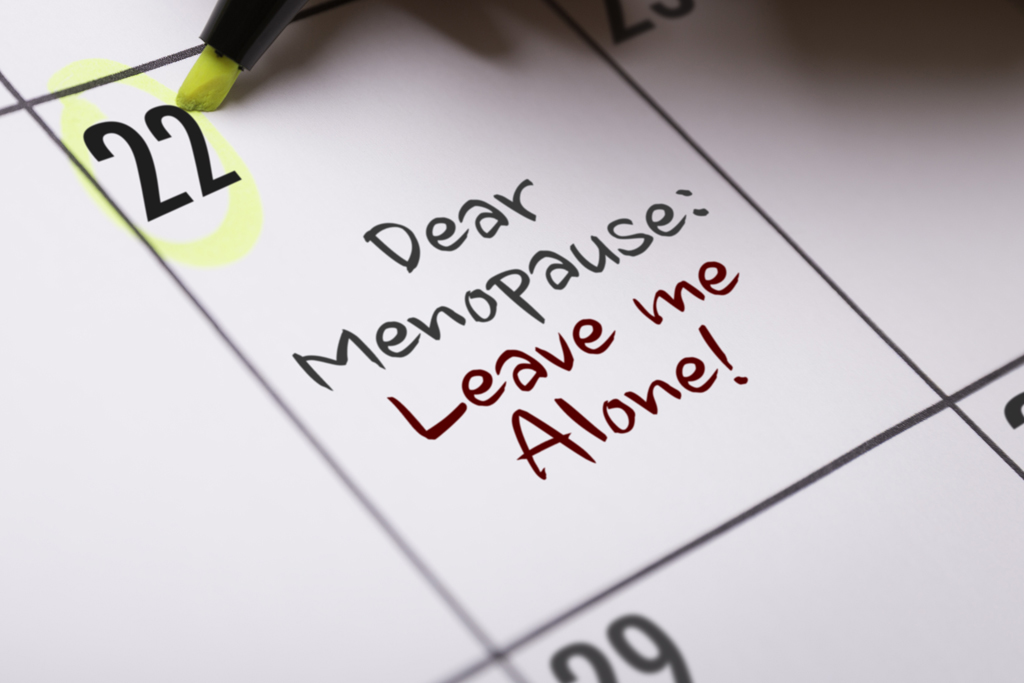Menopause—also known as “the change”—is a normal part of getting older. It occurs when a woman’s estrogen levels begin to drop, resulting in physical and emotional changes (usually between ages 45-55). To many women, it can be a welcome relief—a rite of passage into later life. However, others might find it to be a physical and emotional struggle; not only does it normally mean you’re getting older, but it can also bring with it a wave of puberty-like symptoms that you may have thought were long behind you.
Being properly prepared for menopause is the key to managing it with confidence. It is normally signaled by a year’s worth or more of missed menstrual periods. However, there are other early signs to look for that might help you recognize it sooner, and consequently, be more ready for it.
What are the early signs of menopause?
Spotting the early signs of menopause can help you prepare for its potential challenges. You may want to visit your local medical clinic or family practitioner to discuss any of the symptoms noted below so that you can receive help and treatment that will walk you through them. Please note, however, that as everyone is different, symptoms may vary in severity and frequency, and you may even experience some unusual symptoms not on this list (which are also worth looking into).
Missed or lighter periods
You may notice that your periods become shorter and lighter, or stop altogether. Before menopause is in full swing, you might also notice that your normally clockwork periods occasionally fail to appear. If you are not pregnant, this could be a sign that menopause is near.
Hot flushes
Hormonal changes in your body may cause you to get hot very easily, with increased sweating and a flushed appearance. This is known as a “hot flush.” If this happens, loosen your clothing and take some deep breaths. Hot flushes can begin several years before menopause hits, so it’s certainly one of the key symptoms to look out for. Many women find they can learn to live with this symptom and that it passes after menopause, but others like to seek medications to help.
Trouble sleeping
Even before you notice the symptoms, the hormonal fluctuations of menopause can cause insomnia. If you’re having trouble nodding off or find yourself waking regularly throughout the night, this can be an early sign that menopause is near.
Night sweats
Some menopause-related sleep trouble can also include night sweats. Put simply, night sweats are hot flushes that occur in your sleep, causing excess sweating. You may feel shivery and cold when you wake because the sweat has cooled down on your skin, making you feel as though you’ve been doused with cold water.
Anxiety
A combination of the above hot flushes, hormonal changes, and problems sleeping can heighten your anxiety levels. You may feel socially anxious, or feel that your heart is racing. You may also feel anxious or worried about the future. This is all completely normal. If you are having challenging thoughts tied to heightened anxiety, talk therapy can be a helpful solution for lessening its intensity.
Vaginal dryness
More than 50% of women experience vaginal dryness during and after menopause. The decrease in estrogen levels causes a lack of vaginal lubrication, making the vaginal walls and vulval area more sensitive, and making sex uncomfortable, or even painful. A good lubricant or vaginal moisturizer can do a lot to ease these symptoms, but you can mention them at your next well-woman exam if they persist.
Weight changes
The low estrogen levels associated with menopause can also encourage the build up of fat in the belly area. If you experience this, don’t panic—there could be several reasons for it that may have nothing to do with menopause. However, any fat you gain around your middle is potentially dangerous and worth addressing, as this type of fat is often linked to insulin resistance, heart disease, and Type 2 diabetes. Fortunately, this menopause symptom is not typically irreversible, as frequent exercise and a balanced diet can help significantly in tackling it.
Hair loss / Facial hair growth
Some women in menopause notice mild facial hair growth, particularly around the chin area. Typical hair removal options (such as tweezing, shaving, or waxing) should work to alleviate this. Conversely, some women also notice hair falling out. If you’ve ever been pregnant, you may remember this happening after birth, too: the hormonal changes can cause a little hair shedding. Hair-strengthening shampoos designed for mature women can help drastically, and you may also consider new hairstyles, if any small patches of scalp are showing. Supplements that support strong hair and nails can be very handy, too.
Mood swings
According to the North American Menopause Society, close to 23% of women go through mood swings around the time of menopause, and for two main reasons. First, you may be lamenting the end of your child-bearing years (which is perfectly normal). Second, the drop in estrogen affects multiple areas of the body, including serotonin production, which directly influences how happy or sad we feel. While these mood swings can be challenging, it is important to remember that you don’t have to feel alone during this time, and much like with heightened anxiety, there are several therapy options that can help you manage the more difficult emotions.
At ARcare, we want to help you through this change in your life. Symptoms vary from woman to woman, and there may be some symptoms you’re experiencing that are not listed above. But, whatever your experiences, whether emotional or physical, you can come to us. We offer a full range of women’s health services to help you holistically.
Give us a call today at 866-550-4719, or complete our online appointment form to get started with us. At ARcare, we provide individualized care for all, always.
